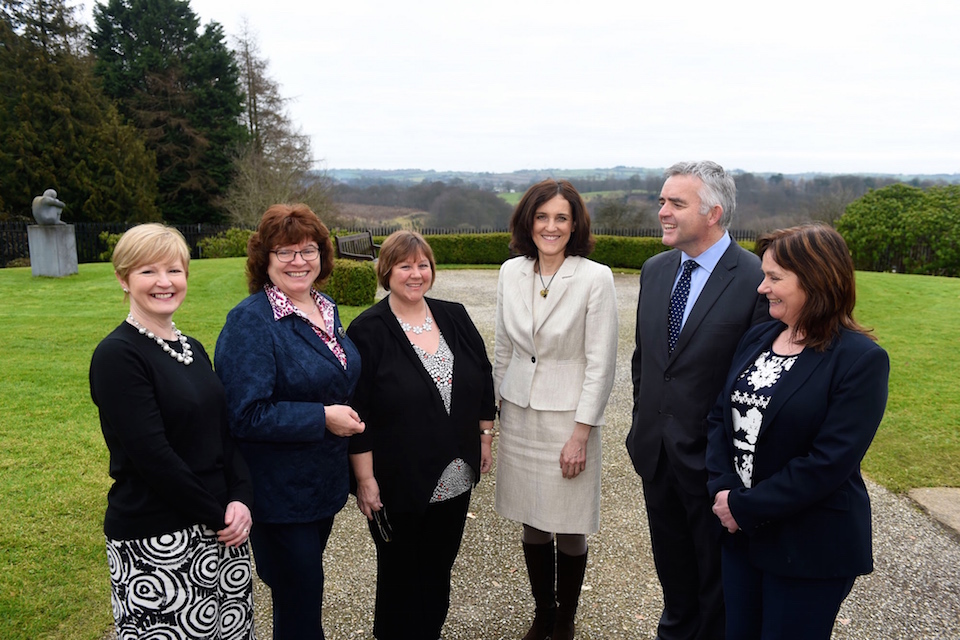Secretary of State's speech at the Women's Engagement Roadshow
Ahead of the 20th anniversary of the Beijing Declaration, Theresa Villiers addresses the NI Women's European Forum on violence against women and girls

I am delighted to be here today and to have this opportunity to meet you and listen to your views.
Thank you all for attending, especially our chair and panel speakers.
I would particularly like to thank the Northern Ireland Women’s European Platform (NIWEP) for organising this event.
This event is one of 9 roadshows the UK Government is holding to listen to women across the UK.
The roadshows mark the 20th anniversary of the Beijing Declaration and Platform for Action; a historic blueprint for advancing women’s rights, agreed by 189 governments in 1995.
This event is an opportunity to have your say on the progress being made to end violence against women and girls in the UK - one of the critical areas of the Beijing Declaration and Platform for Action - and to help decide what the priorities should be for further action.
Your views and suggestions today will contribute to the UK Government’s report to Beijing +20.
They will also be collated and fed back to Ministers and officials who have responsibility for policy development. ### Greater security and opportunity for women
To kick things off this morning, I want to reflect say a little about the Government’s long term plan to improve the lives of women across the UK.
Of course a key concern for women in Northern Ireland today is achieving a shared, peaceful and prosperous society where there is equality for all and a secure future for all children and young people.
The recent Stormont House Agreement, which followed long weeks of negotiations between the UK Government, the Northern Ireland parties and on certain matters, the Irish Government, represents a big step forward for Northern Ireland.
The key task ahead is for all of us is to ensure that the Agreement is now implemented fully and faithfully.
But the Government’s policies are designed to open up a range of opportunities for women.
They are helping more women than ever before to get jobs or start-up their own businesses.
There are now more women in work in the UK than ever before.
And we are reducing taxes, giving women greater financial security.
There are more women-led businesses than ever before - 20% of small and medium sized enterprises are either run by women or by a team that was over 50% female, up from 14% in 2008.
There are more women in employment - 14.4million women are in work, an increase of 796,000 since May 2010.
There are more women on FTSE Boards than ever before - 22.8% of FTSE 100 Directors, up from 12.5% in February 2011. And there are now no all-male FTSE100 boards, down from 21 in 2011.
3.4m workers will be taken out of income tax by April 2015, more than half (58%) of whom will be women.
Our state pension reforms will benefit women who have historically done poorly under the current complicated 2-tier system. And the Government expects that in the first 10 years after implementation, of pension reform over 650,000 women will receive on average £8 a week more in state pension.
Helping women at work
We are helping women at work by reducing the cost of childcare - almost 2m families could benefit from new tax free childcare scheme from autumn 2015, worth up to £2,000 per child.
We are addressing the gender pay gap.
We are increasing flexible working by extending the right to request flexible working to all.
And we are introducing a system of shared parental leave from 2015.
Ending violence against women
This Government continues work to end violence against women at home and abroad by introducing protections from domestic violence, criminalising forced marriage, and prioritising women and girls in our work overseas.
We’ve taken action to protect children from abuse and harmful material online.
We’re working in partnership with expert groups and professional bodies to ensure teachers have the tools and resources they need to help eliminate violence against women and girls.
Our extensive programme of overseas aid has a strong gender focus and is helping 2.3 million women overseas to get jobs and over 5 million girls to attend school.
We are doing all we can to combat the abhorrent practice of female genital mutilation (FGM) in a range of countries.
Moving forward
There is also much that the Northern Ireland Executive is doing to tackle these issues and I know Minister Bell will talk about this shortly.
I would like take this opportunity to acknowledge the very close working relationships that exist at all levels between the Government Equalities Office and the NI Executive.
These relationships and partnership working are helping us to progress women’s equality issues and our responsibilities under the Convention on the Elimination of Discrimination Against Women.
We know there is more to do, but our approach has begun a real shift in improved awareness of violence against women and girls.
Whether it is in our work on criminal justice at home; or our aid programmes which do a huge amount to support education and empowerment for women and girls; or William Hague’s ground breaking work on ending sexual violence in conflict - we are determined to highlight that all forms of gender-based violence are unacceptable, and are never the victim’s fault.
There remain many hurdles to overcome if we are to eliminate all forms of violence and unfair discrimination against women and girls.
Your contributions this morning will help us take forward that vital work and I look forward to hearing what you have to say.
Thank you.